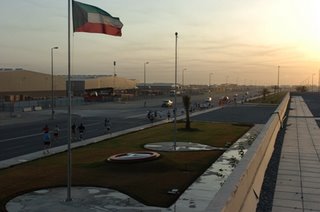Life in Kuwait isn't all that bad, though living in the Rear keeps me entirely too close to the flag pole and the bureaucracy. Imagine working with micromanagement, triple check inventory controls, soldiers too afraid to rock the boat, senior leaders who find it necessary to distribute decrees about the displaying of flags over tents, proper wear of undergarments, and other such nonsense. It can be trying at times.
There is one inescapable fact of military life for the majority of us living in Kuwait and Iraq, the all purpose tent. Military tents are equally cursed and praised by service members. They may sometimes be uncomfortable, like when it rains or when the power goes off, but the tents of today are much better than those of the World War II and Korean War era. Tents keep us dry when it rains, they have plywood floors so we don't trod around in the dirt, and thanks to modern technology, the temperature is regulated through a heat pump which sits outside.
These tents are also easy to assemble. They are made so that anyone, regardless of mental aptitude, can put one up in a hurry. They are made of a special insulating material which helps keep in the air. Through the middle of the tent's ceiling, a plastic vent runs with holes which blows air into the tent. For thousands around the world every day, tents like these are home.
My day begins between 0500 and 0600. My first destination each morning is the bathroom trailer down the dusty road which passes through Tent City. After showering and brushing my teeth with the non-potable water, I return to the tent. I put on my uniform and head off to the S-1 Shop. I check my e-mail and inbox for any smoldering issues which may have ignited overnight, then I head to the morning Stand Up briefing which is held in a secure building a few minutes walk from my office.
Stand Up is the meeting where we get the lowdown on what's happended the night before, intel, operations, as well as equipment updates. It is always interesting and it never fails, I always hear about something going on in Iraq or Kuwait that hasn't made the news or the web and probably never will. It's fascinating. There's actually quite a bit of activity going on in the area. On several occasions our convoys have been challenged and there have been incidents of check point guards have been harrassed. Thus far no one has been shot, that I am aware of at least. Shots fired?? On a rare occasion, yes. But in Kuwait they are referred to as negligent discharges.
Following Stand Up, I hit the chow hall. That's another few minutes away. During the Surges (large influx of troops) there is a 10-minute line at the entrance. We are discouraged from calling it the "chow hall." The politically correct, originators of military etiquette would prefer that we called it the Dining Facility, DFAC for short. Apparently the word "chow" connotes visions of dog food and "the management" would prefer we didn't imply that soldiers eat dog food, or that soldiers are like dogs. Well, some days it doesn't look much better than Alpo, though most days it's not too bad. There is enough variety that no one should go away hungry.
After my morning meal, I wander into the S-1 Shop and start reading paperwork... and more paperwork.... and then more paperwork. I think you get the point. My day is filled with answering the phone, e-mails, various and sundry personnel actions, and running to the Group Commander's office to update the Command Group on the status of things at our down trace units. Occasionally we make trips to Camp Doha, Truckville, Navistar and other places where we have official business.
On a trip to deliver some official mail to Doha recently, we had an encounter with a man going from car to car at an intersection where we were sitting. He approached all the cars in our lane and actually got in the vehicle right in front of ours.... until the occupants forced him out. He moved toward our vehicle but at the last minute decided against it. I guess he saw our uniforms. I was a little nervous, had my hand on my pistol and was not thrilled about the idea of possibly having to point it at him. Thankfully he backed off and I never had to learn what his intentions were or how scared I'd be if things had progressed. He was most likely harmless but as I don't speak Arabic, it would have been difficult for me to tell. I do however speak 9mm, which does not require a translator.
It's a short walk in the dark from the S-1 Shop to my tent. On the way I pass through barricades, by construction ditches and generators, over power cords and past the lovely port-a-potties. The smell of urine, dirt and whatever is on fire and smoldering somewhere in Kuwait is always in the air. Oddly, you do get used to it.
If my day seems long, it's nothing compared to what others go through elsewhere in the Theater. Still, few people here work only an eight-hour day, and days off are rare. But then again, there's not much else to do here but work.
Once in the tent, I change, organize my gear for the next day, and before I fall asleep, I try to read a few pages from whatever book I'm reading at the time. The next morning I do it all over again.
 Ramadan is the ninth month of the Islamic calendar, a lunar calendar. Because the lunar calendar is in synch with the moon and not the sun, Islamic holidays move each year. This year Ramadan began on Sep 24th and it continues through Oct 24th.
Ramadan is the ninth month of the Islamic calendar, a lunar calendar. Because the lunar calendar is in synch with the moon and not the sun, Islamic holidays move each year. This year Ramadan began on Sep 24th and it continues through Oct 24th. 



